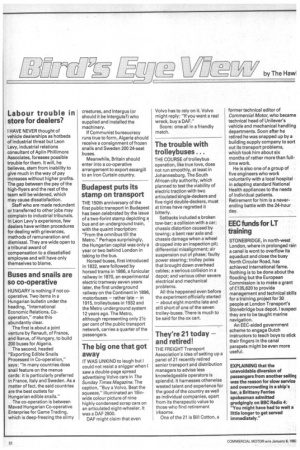by The Hawl
Page 34

If you've noticed an error in this article please click here to report it so we can fix it.
Labour trouble in store for dealers?
I HAVE NEVER thought of vehicle dealerships as hotbeds of industrial threat but Leon Levy, industrial relations consultant of Aplin Phillimore Associates, foresees possible trouble for them. It will, he believes, stem from inability to give much in the way of pay increases without higher profits. The gap between the pay of the high-flyers and the rest of the team will be widened, which may cause dissatisfaction.
Staff who are made redundant or transferred to other jobs may complain to industrial tribunals. In Leon Levy's experience, few dealers have written procedures for dealing with grievances, methods of remuneration and dismissal. They are wide open to a tribunal award of compensation to a dissatisfied employee and will have only themselves to blame.
Buses and snails are so co-operative
HUNGARY is nothing if not cooperative. Two items in a Hungarian bulletin under the heading, "International Economic Relations, Cooperation," make this abundantly clear.
The first is about a joint venture by Renault, of France, and lkarus, of Hungary, to build 200 buses for Algeria.
The second, headed "Exporting Edible Snails Processed in Co-operation," says: "In many countries does snail feature on the menue cards: it is particularly preferred in France, Italy and Sweden. As a matter of fact, the said countries are the best outlets for Hungarian edible snails."
The co-operation is between Mavad Hungarian Co-operative Enterprise for Game Trading, which is deep-freezing the slimy creatures, and Intergus (or should it be Interguts?) who supplied and installed the machinery.
If Communist bureaucracy runs true to form, Algeria should receive a consignment of frozen snails and Sweden 200 24-seat buses.
Meanwhile, Britain should enter into a co-operative arrangement to export escargill to an Iron Curtain country.
Budapest puts its stamp on transport
THE 150th anniversary of the first public transport in Budapest has been celebrated by the issue of a two-forint stamp depicting a bus and an underground train, with the quaint inscription: "From the omnibus till the Metro." Perhaps surprisingly, the Hungarian capital was only a year or two behind London in taking to the bus.
Horsed buses, first introduced in 1832, were followed by horsed trams in 1866, a funicular railway in 1870, an experimental electric tramway seven years later, the first underground railway on the Continent in 1896, motorbuses — rather late — in 1915, trolleybuses in 1932 and the Metro underground system 12 years ago. The Metro, although representing only 21/2 per cent of the public transport network, carries a quarter of the passengers.
The big one that got away
IT WAS UNKIND to laugh but I could not resist a snigger when I saw a double-page spread advertising Volvo cars in The Sunday Times Magazine. The caption, "Buy a Volvo. Beat the squeeze," illuminated an 18mwide colour picture of nine highly condensed scrap cars on an articulated eight-wheeler. It was a DAF 2800.
DAF might claim that even Volvo has to rely on it. Volvo might reply: "If you want a real wreck, buy a DAF."
Score: oine-all in a friendly match.
The trouble with trolleybuses
THE COURSE of trolleybus operation, like true love, does not run smoothly, at least in Johannesburg. The South African city authority, which planned to test the viability of electric traction with two articulated single-deckers and five rigid double-deckers, must at times have regretted it bitterly.
Setbacks included a broken tow-bar; a collision with a car; chassis distortion caused by towing; a bent rear axle and chassis damage when a wheel dropped into an inspection pit; differential misalignment; air suspension out of phase; faulty power steering; trolley poles that brought down overhead cables; a serious collision in a depot; and various other severe electrical and mechanical problems.
All this happened even before the experiment officially started — about eight months late and still short of one of the seven trolley-buses. There is much to be said for the ox cart.
They're 21 today — and retired!
THE FREIGHT Transport Association's idea of setting up a panei of 21 recently retired senior transport and distribution managers to advise less knowledgeable operators is splendid. It harnesses otherwise wasted talent and experience for the good of the country as well as individual companies, apart from its therapeutic value to those who find retirement irksome.
One of the 21 is Bill Cotton, a former technical editor of Commercial Motor, who became technical head of Unilever's vehicle and mechanical handling departments. Soon after he retired he was snapped up by a building supply company to sort out its transport problems, which took him about six months of rather more than fulltime work.
He is also one of a group of five engineers who work voluntarily with a local hospital in adapting standard National Health appliances to the needs of individual patients. Retirement for him is a neverending battle with the 24-hour day.
EEC funds for LT training
STONEBRIDGE, in north-west London, where in prolonged rain a canal is wont to overflow its aqueduct and close the busy North Circular Road, has achieved international fame. Nothing is to be done about the flooding but the European Commission is to make a grant of £135,620 to provide management and technical skills for a training project for 30 people at London Transport's Stonebridge bus depot. I suspecl they are to be taught marine navigation.
An EEC-aided government scheme to engage Dutch instructors to teach boys to stick their fingers in the canal parapets might be even more useful.








































































